This episode is the third in a series introducing the providers at Riordan Clinic
Dr. Lucas Tims is a Naturopathic Oncologist and the Medical Director at Riordan Clinic in Overland Park, KS. In this episode he shares how he got into naturopathic medicine and his specialty – naturopathic oncology. He also discusses some of the benefits of an integrative approach to cancer care.
Thank you to This Episode’s Sponsor
Episode Transcripts
Intro: This is the real health podcast brought to you by Riordan clinic. Our mission is to bring you the latest information and top experts in functional and integrative medicine to help you make informed decisions on your path to real health.
Leah Chischilly: Welcome everybody to the Real Health Podcast. I’m your host today Leah Chischilly and joining me from our Overland park office is Dr. Lucas Tims. He’s a naturopathic doctor and the director of the Overland park Riordan clinic, which is just outside of Kansas City. Thanks for joining me today, Dr. Tims, how are you?
Dr. Lucas Tims: Well, yeah, thanks for setting this up.
Leah Chischilly: I’m so happy that you were able to take the time to talk with us. We are doing a little series with our providers because we want people to get to know them a little bit better and talk about the things that they do and the people that they are. Eventually they’ll be listening to you on a lot of these podcasts. We want them to know more about who they’re hearing. So first and foremost, I just want to ask you, how did you get into naturopathic medicine in the first place?
Dr. Lucas Tims: Well, um, I applied to naturopathic medical school and that was the first step. No, just kidding. I was raised in a family where natural medicine was kind of first and forefront. You know, my parents were very big into nutrition and eating organic before it was like a thing, right. You know, back in the like eighties and seventies. I guess you could probably say my parents would fit the category of like crunchy hippie type people back then. They were really big into macrobiotics and that whole movement. And so that was kind of the foundation for interest and my exposure to realizing that there’s things that can be done outside of the conventional paradigm of medicine. And so that’s where it started.
Dr. Lucas Tims: I would say that throughout my formative years, I became interested in science and medicine in general, but always with a slant towards more natural therapies and nutrition. But when I got to college, I really had a couple of professors or teachers that really helped to mold my outlook on not only medicine, but I think the world in general. They had had some of their own health issues and sort of helped steer me in the direction of seeking a career in medicine, but maybe not one that’s a typical. At that point I still didn’t even know there were naturopathic medical schools. There’s still a lot of people out there that don’t realize there are other types of medical schools that people can go to where you can still become a physician, but you learn about things that are outside of standard of care, drugs, and surgery kind of stuff. So for me, my second year of college, I did some did some research found that there were these schools that offered these different types of programs. And, at that time there were some states that were set up where you could still function as a primary care physician. You could have a full scope of practice. And so that all appealed to me and, that’s kind of what set my eyes on going to naturopathic medical school and ultimately that’s where I ended up.
Leah Chischilly: Awesome. So it was kind of in your blood from the get go, which I think is pretty unique. Some people, a lot of people are steered towards a natural medical schools or modalities because of their own health struggles, but for you, it was just kind of your upbringing, right?
Dr. Lucas Tims : Yeah, I think so. Upbringing and then just having really those two key people in my, in my educational, progression where I was at that age and they were very influential and they happened to kind of steer me more in that direction as well.
Leah Chischilly: Awesome. So Dr. Lucas, you’re kind of a rare breed, especially in this part of the country, the Midwest, in that you’re a Naturopathic Oncologist. What exactly is that?
Dr. Lucas Tims: So Naturopathic Oncology is a specialty organization of the naturopathic physician’s community. Much like traditional medicine has all of its different specialties. Naturopathic physicians can undergo further training and further certification to be recognized as a fellow of the American Board of Naturopathic Oncology. Um, and so that’s, if you ever see after a naturopathic doctor’s name, their credentials, FABNO, that means that they have undergone this additional training and that they are basically certified as a specialist in cancer care. For me, my path to that looked like doing a two year focused residency after I graduated medical school, which was done through Cancer Treatment Centers of America. And it was pretty much a full oncology focused residency seeing high volumes of patients in a hospital setting, which is not always the case for a lot of naturopathic residencies, let alone naturopathic oncology residencies.
Dr. Lucas Tims: That was sort of one of the unique aspects to the CTCA residency that I did was that it was actually in a hospital setting. So we got exposed to a lot of things that you normally wouldn’t see otherwise. But, that sort of allowed me to become a specialist. You can sit for your boards after you’ve either gone through one of those residencies or, there are some other avenues if you’ve been in practice for five plus years, there’s another track that you can access the certification if you go through some additional paperwork. You still have to take the written exam at the end of the day. Naturopathic Oncology essentially is applying naturopathic medicine principles to the field of cancer care. And so that looks like prevention, that looks like supporting patients while they’re going through treatment. That looks like helping with advanced stage cancer, utilizing integrative therapies to support patients through that. And then it also looks like end of life care or transitional care. So really supporting patients across that whole cancer spectrum, utilizing more naturopathic or integrative tools.
Ad: There’s a lot more to this conversation and it’s coming up right after the break.
Today’s episode of the Real Health Podcast is brought to you by the Riordan Clinic Nutrient Store. The nutrient store is your resource for the highest quality nutritional supplements. Every supplement in the store is handpicked by the expert medical staff at Riordan Clinic, providing you with the best quality purity, consistency and effective dosing available visit store.Riordanclinic.org to shop online.
Leah Chischilly: Very nice. I think it’s something that not a lot of people think about doing, pursuing that route. And I liked that you said integrative in that it’s not one or the other, you don’t have to choose care. You don’t have to choose all alternative or natural care. They work very well together. Is that accurate?
Dr. Lucas Tims: I think so. I tell my patients all the time that the goal is to find the best mix of the conventional medicine and more of the integrative or naturopathic therapies that works for you. And for some people it might be more conventional and/or less conventional, and more naturopathic or less naturopathic, but there’s always benefit to be had on both sides. It’s just a matter of blending those two together and doing it in a way that aligns with the patient’s goals and their own views on health and medicine, but also doing it in a way that’s going to provide the most benefit for them.
Leah Chischilly: Absolutely. So when you set out to naturopathic school, was cancer always the path, or was it something that just kind of found you, how did you end up in that residency?
Dr. Lucas Tims: So this one, again, a little more personal for me, kind of like with my parents. When I was in naturopathic medical school. Actually the second year of that four year program, I met my, my now wife, and we began dating. Early on in that process she actually was diagnosed with cancer shortly after we started our relationship. So that was really the turning point for me was helping her through her cancer journey. Her cancer treatment journey was really what fueled my passion for wanting to specialize and work with cancer patients as kind of a full-time gig.
Leah Chischilly: I didn’t know that. So thank you so much for sharing that with us.
Dr. Lucas Tims: Yeah. I mean, she’s doing well now. Just so everybody knows. I mean she did well, she got through it. She did a mix of both conventional and integrative therapies. Right. So it was kind of like a great way for me to see how this can be done. And, like I said, it fueled my passion for it.
Leah Chischilly: Yeah. That’s wonderful. And your passion definitely shows in all the things that you do and the work that you do here at Riordan Clinic. So we really appreciate that you’re here.
Dr. Lucas Tims: I couldn’t have found a better spot as my second chapter in my career after spending almost nine years with CTCA. I’ve been at Riordan clinic now for a couple of years, and like I said, it’s just been a great spot for me to continue to spread my wings, continue to help patients and develop even more tools and protocols, some of which the Riordan Clinic brought to me and some of which I think I’m bringing to the Riordan Clinic. So, it’s been a great relationship and just a really top to bottom stellar organization. I feel blessed to be here.
Leah Chischilly: Awesome. So I want to kind of steer away from the cancer talk a little bit and bring it back to the purpose of this podcast. It’s called the Real Health podcast, and our goal is to help people achieve their own version of real health. So I always like to ask everyone, what does real health mean to you and what are some of the things that you do on a daily basis that help cultivate real health in your life?
Dr. Lucas Tims: Yeah, that’s a great question. I think we should make that the intro question for everybody, maybe you already have, but that would be a great way to tie all this together. To me real health, you know, I think everybody knows it when they see it. They might all call it by something different, but I think everybody inherently understands the term, which is creating health. It’s maximizing the potential of the human body without artificial sources. Right? So you’re not relying on a medication or you’re not relying on a surgery or a drug or an external input always. Instead you’re harnessing the body’s ability to do what it’s designed to do. You know, the immune system itself is designed to protect us from everything that we come into contact with. it’s just a matter of, are we supporting that the right way?
Dr. Lucas Tims: I think the immune system is one way in which you can really understand that connection, but it goes even farther beyond that. It goes into your hormones, your epigenetics, right? Your mental, emotional, state of health, your environment, your community. I think there’s so many ways in which you can foster and support your body’s natural ability to heal and defend itself. Obviously it starts with nutrition. It starts with creating a healthy environment. You have to make sure that you’re giving the body what it needs when it comes to fresh air, sunshine, clean water, like all the fundamentals of health have to be there. Um, so that’s what I focus on in my life is just trying to be really good at the basics.
Dr. Lucas Tims: I don’t pretend to be, you know, a thousand percent healthiest person on the earth, but I think that if you focus on the basics, try to eat healthy most of the time, try to avoid as many exposures to chemicals and synthetic type things that we’re exposed to in our environment all the time. If you try to limit that as much as possible support the body’s ability to eliminate and exercise and get good rest. I mean, at the end of the day, I feel like those are kind of where you’re going to get the most bang for your buck and really tip the scales more in favor of real health versus like a propped up version of health.
Leah Chischilly: Yeah, I think that’s great advice. Just get really good at the basics and then build from there. Awesome. Well, thank you so much for joining me today, Dr. Lucas, it’s always nice to talk to you and we will talk again soon.
Outro: Thank you for listening to the real health podcast. If you enjoy this episode, be sure to subscribe and leave us a review. You can also find all of the episodes and show notes over at realhealthpodcast.org. Also be sure to visit Riordanclinic.org, where you will find hundreds of videos and articles to help you create your own version of real health.


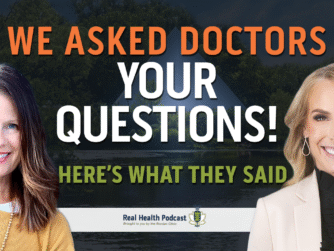
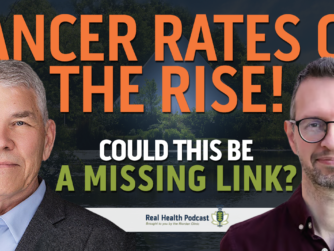
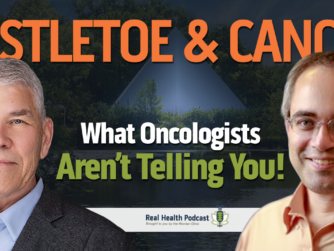
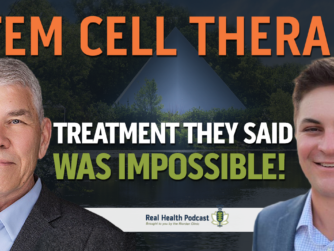
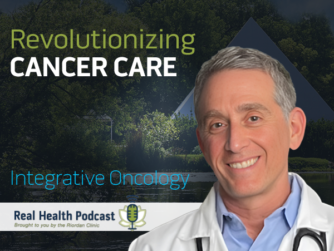
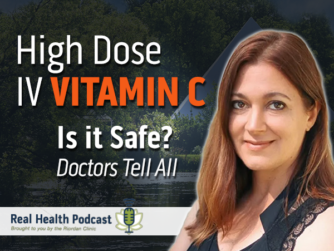
Very helpful information.
I enjoyed listening to episode #3 with Dr. Lucas about his background with naturopathic oncology. I feel like his experience with conventional and integrative care places him in a unique position to best help those with cancer. In future podcasts I would love to hear more about the latest strategies on improving health.